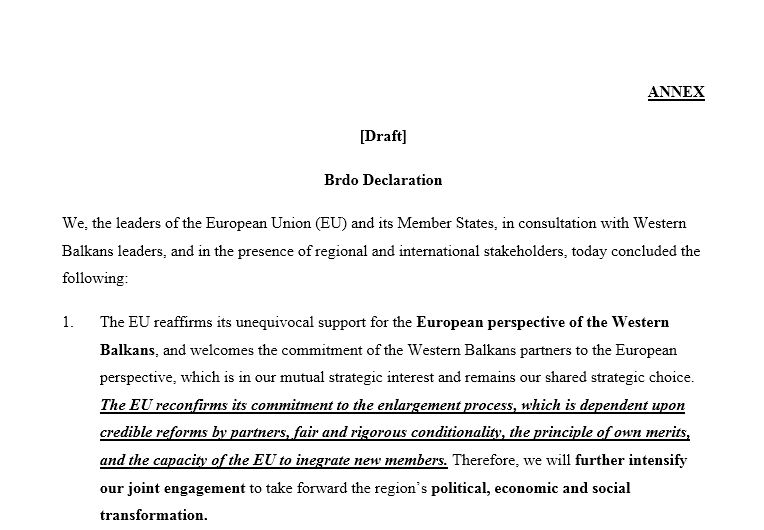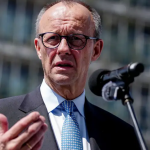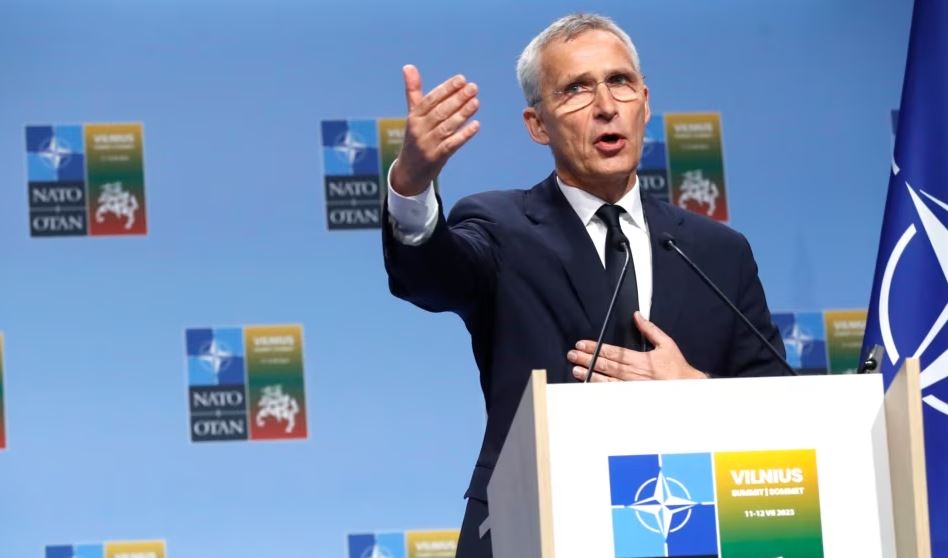Perspektiva e antarësimit në BE, që ka qenë prej vitesh premtimi i madh për vendet e Ballkanit Perendimor, mund të mos jetë më e tillë. Vendet anëtare mund ta fshijnë përgjithmonë këtë garanci, që nga takimi i parë që BE do të mbajë me vendet e rajonit. Ky lajm është konfirmuar nga agjensia prestigjoze e lajmeve Reuters e cila ka pasur mundësi të lexojë një dokument të takimit të gjashtë vendeve të gadishullit me Bashkimin Europian që do të mbahet në 6 tetor në Slloveni.
Bashkimi Evropian, nga frika e reagimit politik në vendet anëtare, nuk mund të pajtohet më për të dhënë garanci për anëtarësimin e gjashtë vendeve të Ballkanit Perëndimor në BE, citon agjencia e lajmeve Reuters katër diplomatë të bllokut dhe një dokument të brendshëm. Lajmi vjen përpara një samiti të BE-së dhe gjashtë vendeve të Ballkanit Perëndimor- Kosovës, Shqipërisë, Maqedonisë së Veriut, Serbisë, Malit të Zi dhe Bosnje e Hercegovinës- që do të mbahet më 6 tetor në Slloveni.
Sipas draft- deklaratës që mban datën 11 shtator, të cilën ka pasur mundësinë ta shohë agjencia Reuters, në këtë samit, BE-ja ka planifikuar të përsërisë premtimin e saj të bërë 18 vjet më parë, për “mbështetjen e saj të qartë për perspektivën evropiane të Ballkanit Perëndimor”. Por pikërisht për këtë pikë, pra për mbajtjen e këtij premtim me sa duket ka pasur mosmarrëveshje. Sipas Reuters, kanë qenë vendet e pasura të veriut ato që kanë treguar rezerva për mbajtjen e këtij angazhimi.
“Shtetet e BE -së nuk i zbulojnë pozicionet e tyre, por vendet e pasura veriore si Danimarka, Franca dhe Holanda kanë frikë nga përsëritja e pranimit të nxituar të Rumanisë dhe Bullgarisë në 2007 që nxiti një valë migrimi të pakontrolluar të punëtorëve drej Britanisë, e cila qe një nga shkaqet që i ktheu shumë britanikë kundër BE -së”, shkruan Reuters.
Pas këtij lajmi bombë të Reuters, Lapsi.al arriti ta sigurojë dokumentin (shiko faksimilet poshte) që u kthye në mollë sherri në dy raunde bisedime, pasi disa vende europiane nuk qenë dakord që aty të mbetej premtimi për “mbështetjen e saj të qartë për perspektivën evropiane të Ballkanit Perëndimor”.
Ky premtim erdhi pas një samiti të mbajtur në vitin 2003 në Selanik të Greqisë, ku shtetet anëtare të BE-së miratuan një deklaratë të përbashkët, ku kanë shprehur mbështetjen e tyre ndaj perspektivës evropiane të vendeve të Ballkanit Perëndimor. “E ardhmja e Ballkanit është brenda BE-së”, nënshkruhej aty. Që atëherë, vetëm Kroacia nga vendet e rajonit është anëtarësuar në BE, në vitin 2013.
©Lapsi.al




4 EU support will continue to be linked to tangible progress on the rule of law and socio-economic reforms, as well as to partners’ adherence to European values, rules and standards.
5 The EU fully supports the Western Balkans partners’ reaffirmed commitment to inclusive regional cooperation and strengthening good neighbourly relations, including with EU Member States. Implementing bilateral agreements in good faith and with tangible results, including the Prespa Agreement with Greece and the Treaty on Good Neighbourly Relations with Bulgaria, remains important. Further, decisive efforts are required to foster reconciliation and regional stability, as well as to find and implement definitive, inclusive and binding solutions to partners’ bilateral disputes and issues rooted in the legacy of the past, in line with international law and established principles, including the Agreement on Succession Issues, and the remaining cases of missing persons and war crimes issues.
6 We fully support the efforts of the EU Special Representative for the Belgrade-Pristina Dialogue and other Western Balkan regional issues and expect concrete progress by the two Parties on the full normalisation of relations between them, which is critical for the stability and development of the whole region and to ensure that they can continue on their respective European paths.
COVID-19
7 The COVID-19 crisis continues to have a severe impact on our societies and economies. It highlights the necessity and advantages of our close and effective partnership. The EU, together with its Member States, has stood by the Western Balkans throughout the pandemic, with health and socio-economic support for the region totalling an unprecedented EUR 3 billion so far. Western Balkans partners are closely involved in EU initiatives, notably the Health Security Committee, the Early Warning System, the Green Corridors and the Joint Procurement Agreement for medical countermeasures. The EU stands ready to further improve access to vaccines, diagnostics, and therapeutics and to ensure a better predictability of and resilience to future crises.
8 The EU also recognises the valuable support the Western Balkans have given during the pandemic to each other and towards the EU. This reflects the solidarity and mutual support the EU is built on. This cooperation and coordination should continue in the future, including throughout the recovery phase.
9 The EU will continue supporting the Western Balkans resolutely, particularly as regards the supply of vaccines. The EU and its Member States have provided [x million] vaccine doses through various channels to the Western Balkans, with more to come. The EU will support the vaccination plans of all partners to help reach similar vaccination rates to the EU average by the end of 2021.
Economic and Investment Plan for the Western Balkans
10 Following the Leaders’ call at the Zagreb Summit, the EU put forward an Economic and Investment Plan (EIP) and guidelines for the Implementation of the Green Agenda for the Western Balkans. The Plan sets out a substantial investment package mobilising some EUR 30 billion for the region over the next seven years, comprised of EUR 9 billion in grant funding and EUR 20 billion in investments, leveraged by the new Western Balkans Guarantee Facility. Maximising the potential impact of the EIP requires the Western Balkans partners to decisively undertake economic and social reforms as well as to strengthen the rule of law. The plan can spur the region’s long-term, green socio-economic recovery and competitiveness, support its green and digital transition, foster sustainable connectivity, regional integration, trade, thereby also strengthening cooperation and convergence with the EU, including with the EU’s climate-related goals.
11 In this framework, the EU has increased the financial package for the EIP for 2021 by an additional EUR [xx] million. This brings the total to EUR [xx] for the launch of the implementation of the EIP this year. We welcome the recent adoption of the legal framework for the implementation of IPA[1] III, which will continue to be the key source of financial assistance for the region, including for the EIP.
[1] Instrument for Pre-Accession Assistance (IPA)
12 Acknowledging the commitment of the Western Balkans leaders to fully implement the Green Agenda, we welcome the agreement on the related Action Plan. In line with the Green Deal, the Agenda is a key driver for the transition to modern, carbon-neutral, climate-resilient and resource-efficient economies, to unlock the potential of circular economy, fight against pollution and improve waste management. Its successful implementation will require a strong commitment from the region. It is essential to focus efforts to ensure a timely and effective transition away from coal through the use of renewable or less carbon-intensive fuels. Energy security should also be prioritised, including the diversification of sources and routes. The EU will continue to support the region in the implementation of the Green Agenda, and on the development of a carbon pricing policy in the context of the EU Carbon Border Adjustment Mechanism (CBAM), including through technical and financial assistance.
13 The EIP enables a new momentum to enhance connectivity in all its dimensions, both within the Western Balkans and with the EU. The EU will continue to support inclusive regional cooperation. Further and decisive efforts by the Western Balkans leaders are needed to deliver on their commitment to establish a Common Regional Market, as agreed at the Berlin Process Summit in Sofia in 2020. This will help advance the region on its European path and will deliver tangible benefits for citizens and businesses. Exploiting the potential of inclusive regional economic integration is essential to boost the socio-economic recovery of the region, and to maximise the benefit from the investments stemming from the EIP. A strong commitment is needed by the entire region to conclude the relevant regional negotiations swiftly.
14 The EU and the Western Balkans agree to step up efforts to enhance the market integration of the Western Balkans with the EU Single Market. In this respect, the EIP provides a solid basis to operationalise market integration of the region within the EU Single Market, notably in areas such as cross border payments (SEPA), industrial and consumer goods, e-commerce and customs.
15 Sustainable transport is a cornerstone of the economic and social integration of the EU and the Western Balkans. It is a priority to further develop the transport connectivity – within the region and with the EU, to improve the efficiency and safety of transport services, and to achieve the objectives of green and sustainable mobility, particularly with regard to rail and inland waterways connectivity.
In the context of sustainable connectivity, we welcome the recently endorsed Transport Community Action Plans for rail, road, road safety, transport facilitation and waterborne transport.
16 Building on the successful implementation of the Regional Roaming Agreement and the start of the free roaming regime in the Western Balkans as of 1 July 2021, we welcome the adoption [tbc] of the roadmap, which will create the conditions and set clear targets for lowering roaming costs between the EU and the Western Balkans.
17 We welcome the concept of EU-Western Balkans Green Lanes and support its practical application at all relevant borders with full respect for the required EU acquis and
18 We welcome [tbc]/ look forward to the launch of the Agenda for Innovation, Research, Education, Culture, Youth and Sport for the Western Balkans, which will promote scientific excellence as well as reforming the region’s education systems, create further opportunities for the youth, and help prevent brain drain.
Political and Security Cooperation
19 Standing together with the EU is a clear sign of our partners’ strategic orientation.Therefore, we re-assert our expectation that partners will further deepen cooperation in the area of Common Foreign and Security Policy (CFSP) and make tangible and sustainable progress towards full alignment with EU foreign policy positions and to act accordingly, including with positions in international fora as an important part of their European path. We welcome that some partners are already fully aligned with all CFSP decisions and declarations and encourage them to continue doing so. The EU stands ready to further strengthen political dialogue on matters relating to CFSP.
20 The EU and the Western Balkans share a number of security challenges that demand coordinated action. We agree to strengthen our cooperation on core security issues, including at operational level, building on the work done under the Sofia Priority Agenda. Our partners pledge to demonstrate their commitment to our shared security and to continue to develop effective instruments for intra-Western Balkans cooperation. They have proven their commitment to CSDP, by contributing to EU missions and operations, and we will work together to further develop their capabilities and capacities, notably through the European Peace Facility. The EU will enhance its engagement also in fields such as space and military mobility to ease access of civil-military assistance to the region in the event of pandemics and natural disasters.
21 We will reinforce our cooperation to address disinformation and other hybrid threats, originating in particular from third-state actors seeking to undermine the region’s European perspective. The EU and the Western Balkans will reinforce cooperation on resilience-building, on enhancing our collective cyber security and cyber diplomacy and on increasing the impact of our strategic communication.
22 We commend our partners for their continued efforts and constructive cooperation on migration, which have delivered clear results. Migration management is a joint challenge, which the EU and the Western Balkans need to address together, in close partnership.
23 Our cooperation in addressing migratory challenges has demonstrated its value and will be further developed. The EU is ready to continue its engagement and strengthen its support through a tailor-made and comprehensive approach. Focus areas should include improvement of asylum systems, tackling migrant smuggling and illegal migration, returns processes, border management, information exchange, and reception capacity. Partners should also work further to enhance return systems, including the conclusion of readmission agreements with key countries of origin. Mutual cooperation on return will be deepened, maximising the use of existing frameworks and available channels. Cooperation should also be intensified with Frontex, the European Asylum Support Office and Europol. The remaining Frontex status agreements should be concluded without delay.
24 Given the seriousness of the situation in Afghanistan, the EU will work closely with all its partners, including the Western Balkans to tackle the evolving challenges and coordinate joint responses, as appropriate.
25 Terrorism, radicalisation and organised crime continue to pose serious security threats to the EU and to the whole region. We call for further strengthening cooperation on counter-terrorism and countering violent extremism, including the prevention of the financing of terrorism and radicalisation. We reiterate the importance of taking resolute action to address serious and organised crime, in particular trafficking and smuggling of human beings, money laundering, drug cultivation and trafficking.
26 The EU is fully committed to preventing illicit trade and trafficking in small arms and light weapons and their ammunition, and will continue to support the Western Balkans in this field, including in the context of the Western Balkans dedicated roadmap against illicit firearms trafficking.
27 To further promote our shared interests, we express our readiness to reinvigorate and enhance regular political dialogue with the region. In this context, we welcome the holding of EU-Western Balkans Summits as regular events. We look forward to the next summit, which will be held in 2022.
***
28 The EU and the Western Balkans need to work together to face generation-defining tasks. We welcome the initiatives of the Western Balkans to contribute to the reflections on the future of our continent. We remain committed to listen to all Europeans on the issues that matter for all of us – protecting citizens and freedoms, developing a strong and vibrant economic base, advancing the green and digital transitions, rule of law, fair and social Europe, strengthening Europe’s resilience, as well as Europe’s leading global role.
29[We welcome that our Western Balkans partners align themselves with the above points.]















